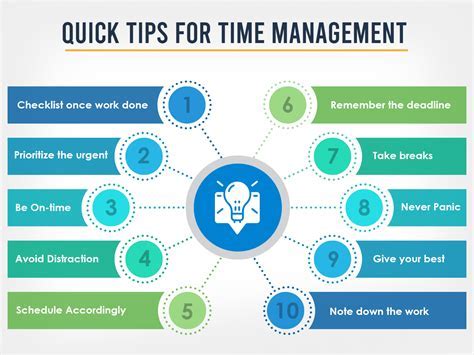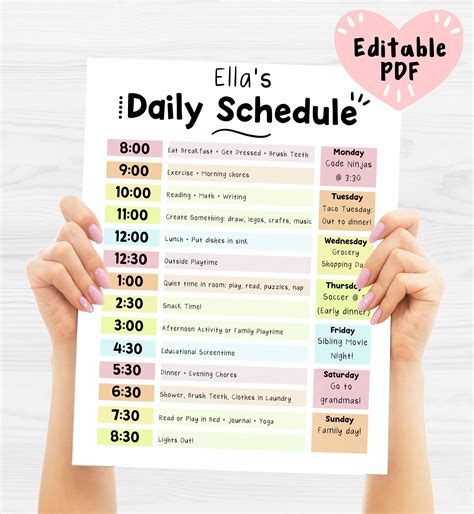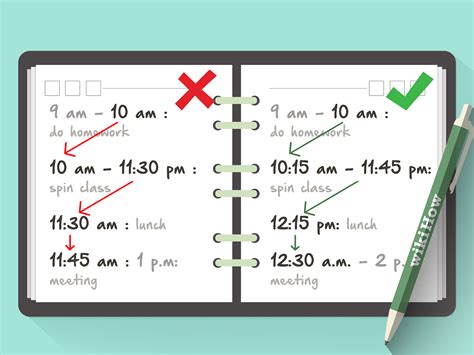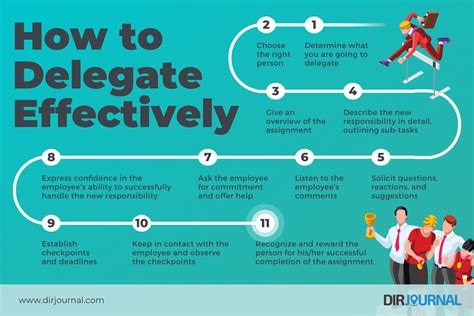Do you often find yourself struggling to make the most of your time? Are you constantly feeling overwhelmed with tasks, deadlines, and responsibilities? If so, you are not alone. Many individuals face challenges when it comes to managing their time effectively.
In today's fast-paced world, being able to efficiently use your time is an essential skill. Whether you are a student, a professional, or a homemaker, enhancing your time organization abilities can have a significant impact on your productivity and overall well-being.
1. Streamline Your Priorities: To effectively manage your time, it is crucial to identify your priorities. Determine the activities that are most important to you and allocate your time accordingly. Focus on tasks that align with your goals and leave room for meaningful activities that bring you joy and fulfillment.
2. Harness the Power of Planning: Create a daily, weekly, or monthly schedule to map out your tasks and commitments. Set realistic deadlines and allocate sufficient time for each activity. Planning ahead allows you to stay organized and prevents last-minute rushes.
3. Break It Down: Large tasks can often feel overwhelming and lead to procrastination. To tackle these tasks effectively, break them down into smaller, more manageable segments. This approach helps you stay focused, motivated, and less likely to feel overwhelmed.
4. Implement Effective Time Allocation: Evaluate the time you spend on various activities and identify any inefficiencies. Minimize distractions, such as excessive use of social media or browsing the internet aimlessly. Instead, allocate specific blocks of time for focused work, and use breaks for relaxation and rejuvenation.
5. Utilize Time-Management Tools: Take advantage of technology and use various time-management applications and tools. These can help you track your time, set reminders, and stay organized. Experiment with different tools to find the ones that work best for you.
6. Learn to Delegate: Recognize that you cannot do it all by yourself. Delegate tasks to others when appropriate, whether it is at work, home, or within a team. Delegating not only lightens your load but also provides opportunities for others to develop their skills.
7. Practice the Art of Saying No: It is essential to set healthy boundaries and learn to say no to commitments that do not align with your priorities. Respect your time and protect it from unnecessary obligations that may hinder your productivity.
8. Prioritize Self-Care: Taking care of yourself is crucial for maintaining a healthy work-life balance. Make sure to allocate time for self-care activities, such as exercise, hobbies, and relaxation. When you prioritize self-care, you enhance your overall well-being, which positively affects your time management abilities.
9. Stay Flexible: While planning and structure are important, it is also essential to remain flexible. Be prepared for unexpected events or changes in priorities. Adaptability allows you to navigate through challenges efficiently and adjust your plans accordingly.
10. Celebrate Your Progress: Recognize and celebrate your achievements, no matter how small. Acknowledging your progress boosts confidence, motivation, and encourages you to continue improving your time organization skills.
Remember, effective time management is not about adding more hours to your day, but about making the most of the time you have. By implementing these strategies, you can enhance your productivity, reduce stress, and create a more balanced and fulfilling life.
10 Crucial Strategies for Mastering Your Time Organizational Proficiency

Improving our effectiveness in managing time is a constant goal for individuals striving for success. To achieve this, it is essential to develop a robust set of skills that will empower us to make the most of every minute and hour in our day. By employing proven strategies, we can enhance our time-management abilities and optimize our productivity. In this section, we will explore ten crucial techniques that will enable us to take control of our time and become masters of our own schedules.
- Prioritize tasks according to their importance and urgency.
- Set realistic and achievable goals to maintain focus and motivation.
- Break down larger tasks into smaller, more manageable subtasks.
- Utilize effective tools and technologies to streamline and automate processes.
- Establish a structured routine to maintain consistency and discipline.
- Learn to say no to nonessential commitments and distractions.
- Delegate tasks when appropriate to free up valuable time.
- Practice effective communication to minimize misunderstandings and save time.
- Take regular breaks to recharge and maintain mental clarity.
- Continuously evaluate and adjust your time-management strategies for ongoing improvement.
By implementing these ten crucial strategies into our daily lives, we can gain a higher level of control over our time and accomplish more without getting overwhelmed. With dedication and practice, mastering time management skills becomes an achievable goal that can have a profound impact on our personal and professional success.
Set Clear Priorities and Goals
When it comes to managing your time effectively, one crucial aspect is setting clear priorities and goals. This means identifying what is most important and focusing your time and energy on those tasks or objectives that will bring you closer to achieving success. By setting clear priorities, you can avoid wasting time on unimportant or less urgent activities, ensuring that you make the most of your available time and resources.
One effective way to set clear priorities is by creating a to-do list or using a task management tool. This allows you to organize your tasks and goals in a structured manner, providing a visual representation of what needs to be done. By categorizing your tasks based on their importance and urgency, you can easily identify which ones should be tackled first. Additionally, breaking down larger goals into smaller, manageable tasks can help you stay focused and motivated, as you can track your progress and celebrate small victories along the way.
Another important aspect of setting clear priorities is understanding your own values and aspirations. By aligning your goals with your personal values, you can ensure that you are investing your time and efforts into what truly matters to you. This helps create a sense of purpose and motivation, making it easier to stay committed and dedicated to your tasks. Prioritizing tasks that are in alignment with your long-term goals will bring a greater sense of fulfillment and satisfaction.
- Regularly reviewing and reassessing your priorities is essential. As circumstances change and new opportunities or challenges arise, it's important to adjust your priorities accordingly. This allows you to stay flexible and adaptive, ensuring that your time is always allocated to what is truly important in the present moment.
- Learn to say "no" when necessary. Setting clear priorities means being able to identify tasks or commitments that are not aligned with your goals or values. It's okay to decline additional responsibilities or requests that will only divert your attention and prevent you from focusing on what truly matters. By saying "no" to nonessential tasks, you free up more time and energy for the things that are truly important to you.
- Incorporate time management techniques, such as the Pomodoro Technique or time blocking, to help you stay focused and productive. These techniques can assist in prioritizing tasks and allocating dedicated time slots to work on specific activities. By setting aside uninterrupted blocks of time for important tasks, you can avoid distractions and ensure a higher level of concentration and efficiency.
In conclusion, setting clear priorities and goals is a foundational component of effective time management. By identifying what truly matters and aligning your actions with your values and aspirations, you can optimize your use of time and achieve greater success. Incorporating techniques such as task prioritization, goal breaking, and regular reassessment can help you stay focused, motivated, and productive.
Create a Daily Schedule

One key aspect of effective time management is being able to efficiently plan and allocate your time throughout the day. A daily schedule is a valuable tool that can help you stay organized and make the most of your time. By creating a daily schedule, you can prioritize your tasks, set realistic deadlines, and ensure that you have enough time for both work and personal activities.
A daily schedule allows you to break down your day into manageable blocks of time, making it easier to allocate specific tasks and activities to each time slot. This helps prevent you from feeling overwhelmed and ensures that you have a clear plan of action for each day. Additionally, a schedule can help you identify any gaps or areas of inefficiency in your day, allowing you to optimize your time usage and make necessary adjustments.
When creating your daily schedule, it's important to prioritize your tasks based on their importance and urgency. Start by identifying the most critical tasks that need to be completed and allocate sufficient time for them. Consider using tools such as to-do lists or task management apps to keep track of your tasks and deadlines. By breaking down larger tasks into smaller, more manageable sub-tasks, you can make progress and stay motivated throughout the day.
| Time | Task/Activity |
|---|---|
| 8:00 AM - 9:00 AM | Morning routine and breakfast |
| 9:00 AM - 10:00 AM | Respond to emails and prioritize tasks |
| 10:00 AM - 12:00 PM | Work on project A |
| 12:00 PM - 1:00 PM | Lunch break |
| 1:00 PM - 3:00 PM | Attend meetings and collaborate with colleagues |
| 3:00 PM - 4:00 PM | Work on project B |
| 4:00 PM - 6:00 PM | Complete administrative tasks |
| 6:00 PM - 7:00 PM | Exercise or personal time |
| 7:00 PM - 9:00 PM | Family time and relaxation |
| 9:00 PM - 10:00 PM | Review tasks for the next day and plan |
Remember that flexibility is key when it comes to your daily schedule. Unexpected events or changes in priorities may require you to adjust your schedule accordingly. Be open to making modifications while still ensuring that your core tasks and goals are accomplished. By consistently following a well-planned daily schedule, you can enhance your time management skills and ultimately achieve greater productivity and success.
Eliminating Distractions: Boosting Focus and Productivity
In the fast-paced modern world, it can be challenging to stay focused and productive on our tasks due to various disturbances and diversions. To optimize our time management skills, it is essential to identify and eliminate distractions that hinder our progress.
- Avoid Multitasking: Instead of trying to juggle multiple tasks simultaneously, focus on one task at a time to enhance concentration and efficiency.
- Organize Your Workspace: Ensure that your physical workspace is tidy and clutter-free, as a chaotic environment can lead to distractions and decreased productivity.
- Establish Clear Goals: Set clear and specific goals for each day or project, enabling you to stay focused on the essential tasks and avoid getting sidetracked.
- Minimize Digital Interruptions: Turn off notifications on your electronic devices, put your phone on silent, and close unnecessary tabs or applications to eliminate digital distractions.
- Time Blocking: Create dedicated blocks of time for specific tasks or activities, allowing you to fully concentrate on one task without interruptions or distractions.
- Implement a Routine: Establish a consistent daily routine that includes designated periods for focused work, breaks, and relaxation, enabling you to maintain a disciplined approach.
- Manage Social Media Use: Limit your time spent on social media platforms by setting allocated periods for checking and responding to messages or posts.
- Communicate Boundaries: Clearly communicate your availability and boundaries to colleagues, friends, and family to minimize interruptions during dedicated work time.
- Use Productivity Tools: Explore the numerous available productivity apps and tools that can assist in managing distractions, such as website blockers or task management systems.
- Practice Mindfulness: Cultivate a mindful mindset by engaging in meditation, deep breathing exercises, or other mindfulness techniques to enhance focus and reduce distractions.
By consciously eliminating distractions and implementing strategies to improve focus, you can enhance your productivity, accomplish tasks more efficiently, and ultimately improve your time management skills.
FAQ
What are some effective time management tips?
Some effective time management tips include setting clear goals, prioritizing tasks, creating a schedule or to-do list, avoiding multitasking, taking breaks, and using tools or techniques such as the Pomodoro Technique.
How can I improve my time management skills?
To improve time management skills, it is important to analyze how you currently spend your time, set SMART goals, identify your priorities, practice delegation, learn to say no, minimize distractions, focus on one task at a time, and regularly review and adjust your schedule.
What can I do to overcome procrastination and manage time more efficiently?
To overcome procrastination and manage time more efficiently, you can break tasks into manageable chunks, set deadlines for yourself, eliminate distractions, establish a routine or schedule, use positive reinforcement, and seek accountability from others.
How can I make the most of my time and increase productivity?
To make the most of your time and increase productivity, you can prioritize important tasks, establish daily or weekly goals, eliminate time-wasting activities, avoid perfectionism, delegate tasks, manage stress effectively, and take care of your physical and mental well-being.
Are there any specific tools or techniques that can help with time management?
Yes, there are several tools and techniques that can help with time management. Examples include using a digital or physical planner, setting reminders, using time tracking apps, practicing the 80/20 rule, utilizing the Eisenhower Matrix for prioritization, and implementing the "Two-Minute Rule" to tackle small tasks immediately.
How can I improve my time management skills?
There are several effective tips for improving your time management skills. Firstly, you can prioritize your tasks by creating a to-do list and identifying the most important tasks. Additionally, you can break down big tasks into smaller, more manageable ones. Another tip is to avoid multitasking and instead focus on one task at a time. Managing your distractions, such as turning off notifications or setting specific time blocks for checking emails, can also help. It's also important to schedule regular breaks to avoid burnout. Lastly, you can try using time management tools or techniques, such as the Pomodoro Technique or time blocking, to increase your productivity.







